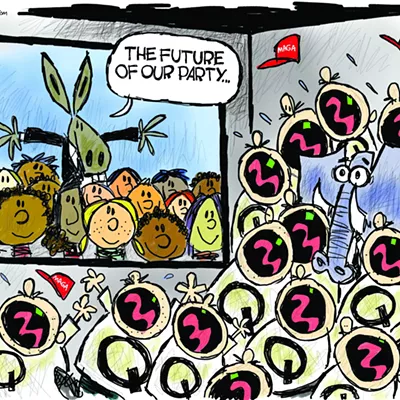Kromko--whose arguments have grown increasingly scatterbrained in recent years--wants to do so many things for you. He wants to repeal the unfair trash fee! Keep sewage out of your taps! Stop runaway growth!
Unfortunately, when Kromko's not wrong, he's offering lousy "solutions" that will actually make matters worse.
Here are five reasons to refuse to swallow Proposition 200, a fetid cocktail of unintended consequences:
1. LESS REGULATION OF GROWTH
Prop 200 would prevent Tucson Water from hooking up new customers once it starts serving 140,000 acre-feet of water annually, unless voters agree to raise the cap.Kromko wants you to believe that this will ensure that Tucson Water's current customers will always have water, and we'll finally get a handle on our growth.
Unfortunately, what it will really do is start a race to form small water companies that will suck up water wherever they want to--like, for example, the city's rebounding central well field--while recharging it somewhere downstream.
And if that becomes too troublesome, the developers will just move out of Tucson Water's service area, which means more sprawl.
Even Kromko admits these would be consequences of Prop 200, although he tries to argue that water will be scarce, and it will be more expensive for developers to do business.
We don't really get how that makes things better--unless, by "better," you mean less regulation of growth, higher housing prices and more traffic.
2. THE CAP IS TOO LOW
Prop 200 cuts off those new connections once the city is serving 140,000 acre-feet annually. Kromko equates this with the city's Central Arizona Project allotment, although the city is actually eligible for about 144,000 acre-feet of CAP water--and we are allowed to mine some of the groundwater that nature replenishes.Is 4,000 acre-feet of water a year worth quibbling over? Damned right it is, especially as demand for CAP water grows, and other cities try to figure out how to help themselves to some of our share. Should we really send the message that we don't want all of it?
3. RIDICULOUS LIMITS ON THE USE OF EFFLUENT
We're repulsed by the idea of toilet-to-tap, but that's not what Tucson Water is planning. Last week, Tucson Water director Dave Modeer told us that the utility has abandoned the idea of serving any treated effluent for the foreseeable future, though in a few decades, the utility may return to the idea of running effluent through a more intense treatment process and then recharging it.Prop 200 would block any possibility that Tucson Water might do something like that. Treated effluent can only be used for irrigation--and no more than what's needed to "sustain the vegetation involved"--or be recharged in the Santa Cruz riverbed.
Here's another example of Kromko's paranoia: He's so convinced that Tucson Water will try to find a way around Prop 200 that he's come up with ridiculous limits on where and how much effluent can be recharged. Not one more gallon than what's needed to sustain the vegetation? What, precisely, does "sustain" mean? Do you give the bushes and trees enough water to stay alive, but not enough to thrive?
Can't you see the lawyers arguing over that one on Boston Legal?
4. IT'S A LEGAL QUAGMIRE
Despite Kromko's arguments to the contrary--he says Prop 200 is "actually very well written"--the initiative is full of legal ambiguities that lawyers have been picking apart through this campaign.In an effort to prevent Tucson Water from getting around restrictions by selling water to a subsidiary, Prop 200 prevents the city utility from supplying water to any other "distributor." But Kromko didn't bother to define "distributor," which has allowed Prop 200's opponents to point out that the UA, the Veterans Affairs hospital and dozens of other entities are technically considered "water providers" under state law.
We think the opponents are overstating that case, but since Prop 200 gives any Tucson Water customer the right to sue to enforce the law, it's certainly conceivable that the question could end up in front of a judge.
City Attorney Mike Rankin raised other issues last month, saying that Kromko hadn't bothered to define what sort of water would be included under the 140,000 acre-feet cap that triggers the cutoff of future connections. Rankin says that reclaimed water could also be included, which would result in Tucson Water hitting the limit a lot sooner than Kromko intended. Kromko argues that he meant drinking water, but Rankin points out that the former state lawmaker was a lot more careful about his language elsewhere in the proposition.
As Rankin notes: "If the drafters of Proposition 200 intended the 140,000 acre-foot cap to apply only to potable or drinking water, they surely knew how to write this section to be so specific."
Our summary judgment: This thing has enough legal problems to keep it tied up in court for years.
5. QUIT BITCHING ABOUT THE TRASH FEE
Kromko is outraged that Tucsonans have to pay $14 a month to have their garbage picked up.Well, guess what? It costs money to haul your trash away. Asking people to pay a modest fee is not an outrageous demand; it happens in nearly all Western U.S. cities. Here in Pima County, residents who live outside the city limits pay even more.
We're sick to death of hearing politicians bitch about the unfairness of the trash fee--especially the Democrats on the City Council, who all opposed it until they actually had the power to do something about it. Then they suddenly realized that maybe it was a good idea to charge for trash collection so that other money in the city's general fund could go toward paving streets and hiring cops and firefighters.
This, by the way, is not a shell game. It's a perfectly normal way of doing business. Paying a fee for trash collection means the money that's already in the city budget can pay for something else. Only a complete idiot wouldn't be able to understand that, and only a pandering politician who wants to confuse voters would cook up a phony argument about how the people are being fooled.
Since they know they can't campaign against the trash fee anymore, the Democrats running for office this year are trying to sell a new version of the argument against it: The Republicans on the City Council who enacted the trash fee were really mean about the way that they did it, but it turns out the money is necessary after all, so they don't support getting rid of it.
What a steaming load of crap.
Here's the real truth: The Republicans--and Democrat-turned-independent Carol West--showed real leadership by imposing the trash fee so that this community could finally start fixing the crumbling streets while still providing social services to the needy.
Kromko likes to point out that the City Council could vote to reinstate the trash fee if Prop 200 passes.
Here, Kromko is talking out both sides of his mouth. Sometimes, he says that the city doesn't need the money, and it can just tighten its belt, even though he--and most of the other critics of the fee--have an astonishing inability to come up with specific cuts in city spending that add up to anything resembling $23 million. Other times, Kromko makes the statement the City Council would be free to create a new trash fee. They just wouldn't be able to put it--or any other fee--on water bills.
Oh, come on. Can you imagine how Kromko--and the other loudmouths who whine incessantly about the fee--would squeal about how "the people have spoken" if the council tried to reinstate a trash fee that was repealed by the voters?
A final note: Kromko professes to be baffled about why the trash fee was included on water bills. For a guy who crusades against government waste, he seems to have a hard time understanding the occasional moment of government efficiency.
It costs a million dollars a year, give or take, just to pay for postage on the water bills that the city sends out. Even after you realize that about 40 percent of Tucson Water customers live outside the city and don't pay the trash fee, that means that sending a separate bill for trash collection would cost about $600,000 in postage alone. And that's before you come up with the printing costs and the manpower of tracking separate payments.
Kromko's prescription sounds like a perfect example of government waste to us.
There's no doubt that the entire region is facing water problems as we grow and grow and grow. Kromko has touched on a legitimate problem that requires more attention that it's getting.
But his solutions would create more water problems than it would solve--and it would blow a giant hole in the city budget.
Vote no on Prop 200. Flush this crackpot scheme.











